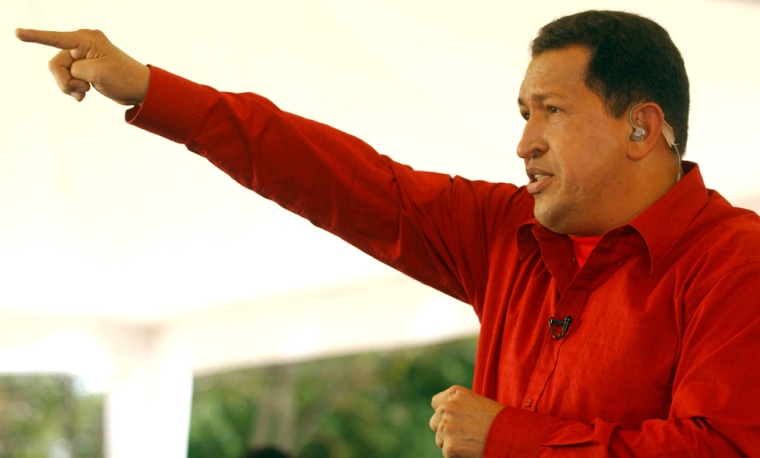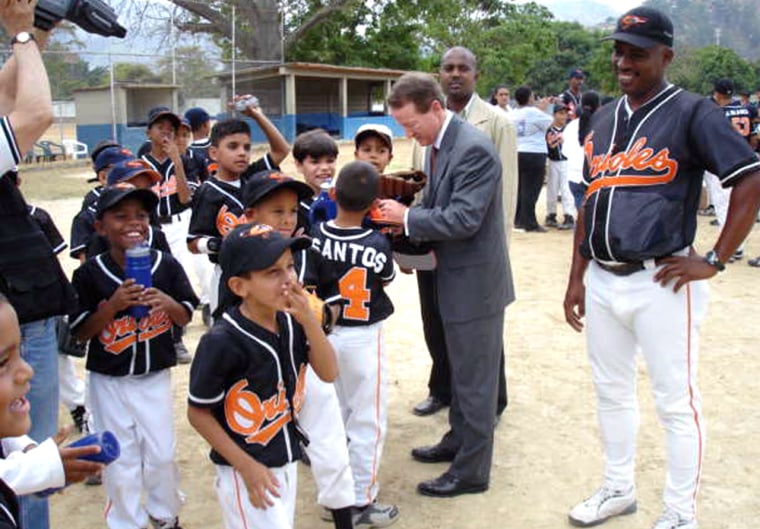The Venezuelan government cited the U.S. ambassador’s charity visits to poor neighborhoods as a sign that he is meddling in the country’s internal affairs, and said Monday he could face expulsion for aligning himself with the opposition.
Chavez first threatened to kick out U.S. Ambassador William Brownfield on Sunday, accusing him of trying to provoke confrontations in recent run-ins with pro-government protesters.
The State Department responded sharply, saying it wouldn’t tolerate any more “thuggish” activities like those faced by the ambassador last week, when Chavez supporters pounded on his car, hurled eggs and tomatoes, and chased his convoy on motorcycles.
The U.S. warned if it happens again, Venezuela’s ambassador in Washington could see own his movements restricted — the sort of measure that Chavez warned would lead him to kick out the American envoy.
Tensions over oil
The dispute raised the stakes in long-standing tensions between Chavez’s government and the U.S., which remains the top buyer of Venezuelan oil.
Venezuelan Information Minister Willian Lara accused Brownfield of acting like a “bully” and trying to influence public opinion.
“William Brownfield is more active than any Venezuelan opposition leader,” Lara said. “You don’t see the ambassadors of Norway, China, or any other country ... in an activity that has such a clear proselytizing nature.”
Brownfield came under harsh criticism for handing out gloves, baseballs and other gear to young baseball players shortly before Friday’s confrontation. Chavez, who has supplied millions of gallons of discounted heating oil to poor Americans, called the ambassador’s visit “demagoguery” and an attempt by Washington to extend its influence.
Styles of diplomacy
U.S. officials say Brownfield does much the same as ambassadors in any other country, but he keeps a particularly busy schedule of community appearances, making donations to children’s homes, libraries, soup kitchens and other charities.
Brownfield says it’s all part of diplomacy and that when he meets local officials, he invites those of all political leanings, but often the pro-Chavez officials don’t take up the invitation.
The government’s suspicions toward the U.S. have run deep since a short-lived coup in 2002, when the U.S. government swiftly recognized the interim leaders before a popular rebellion swept Chavez back to power.
U.S. Embassy spokeswoman Salome Hernandez said Brownfield’s visits are part of his “community outreach” efforts and that he has no intention of scaling them back.
In interviews, Brownfield generally declines comment on Venezuela’s internal affairs. But when asked last year about accusations of U.S. plots against Chavez, he rattled off a list of things Chavez has blamed on the U.S., from foiled assassination plots to floods brought on by global warming.
“Ladies and gentlemen, how can I get any sleep with so many conspiracies and plots?” he quipped.
‘Go prepare your bags’
His tactics appear to be grating on Chavez, who on Sunday said Brownfield was “looking for an incident” by going to the pro-Chavez neighborhood.

“If you continue provoking us, go prepare your bags because I’m going to throw you out of here,” Chavez said.
In Washington, State Department spokesman Sean McCormack reaffirmed the U.S. view on Monday that the harassment of Brownfield was not a spontaneous act but rather was planned by government officials.
“If we see an incident like this again, I think that there are going to be serious diplomatic consequences,” McCormack said. “And I think that the Venezuelan ambassador might find his ability to move around the United States severely restricted.”
Another official said the administration may take steps to prevent Venezuelan Ambassador Bernardo Alvarez from leaving the grounds of his residence in Washington. The official asked not to be identified because the issue is still under study.
In Caracas, Venezuela’s top diplomat for North America, Mari Pili Hernandez, said it would be a violation of international law should the United States restrict Alvarez’s travels.
